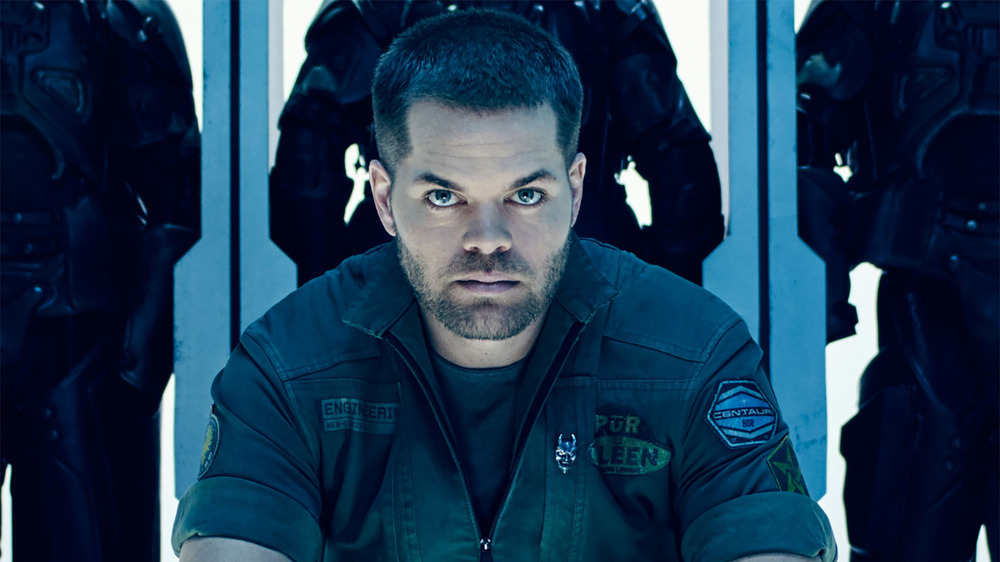The Expanse's Author Reveals What The Series Does Better Than The Books - Exclusive
There's a big difference between writing a novel and writing a television show. Just ask author Daniel Abraham. Not only is he one half of the duo known as James S. A. Corey, who created The Expanse and wrote all nine of the novels the show is based on, but he's also a fixture in the Amazon Prime Video adaptation's writers' room, where he's helped the space opera on its voyage from the page to the small screen.
For Abraham and his writing partner Ty Franck, it was a big adjustment. "We came in learning how to make a TV show and learning how to write a screenplay, which is totally not like writing a book," Abraham tells Looper in an exclusive interview. "It was a terrible learning curve, because all of the things that make a book really good make a script really terrible. I went in there writing like I was writing short stories. It doesn't work at all."
However, after five seasons — and some help from the veterans on The Expanse's staff, including writer Dan Nowak and co-showrunner Naren Shankar — Abraham did eventually figure it out. "Helping us understand what this process was and how to engage with it in a way that was useful [was so important]," he says. "I feel educated now in a way that I just wasn't when we started this."
In fact, Abraham thinks there are a few things that worked even better in the TV series than they did in the books, thanks to both the show's tweaks to the timeline as well as the unique opportunity to tell a story for a second time.
"There were a bunch of things that the retelling allowed that were fascinating," Abraham shares. "The thing that really stuck out to me was in the second season, when we got to include Paolo Cortázar, who's from a novella called The Vital Abyss and doesn't really come into his own in the series until pretty late in the game."
For those of you who need a quick refresher, Cortázar was the character played by Carlos Gonzalez-Vio, who studied The Expanse's mysterious protomolecule and had his empathy surgically removed. Introducing Cortázar into the story earlier let viewers experience his story from a new angle, and allowed him to interact with characters he didn't get to meet in the books. As Abraham notes, "We got to have his experience with psychosurgery and having his contents physically removed."
Abraham also highlights some of the memorable scenes between Cortázar and the Rocinante's heavy, Amos Burton, as places where the show improved on the text: "I think those two characters have a lot to say to each other, and they just didn't wind up in the same place at the same time in the books. [...] Getting to see that play out was great."
How The Expanse TV show changed the books it's based on
Of course, the lessons that Abraham and Franck learned in The Expanse's writers' room aren't limited to the show. Even as the TV show has been airing, earning The Expanse a whole new set of fans, Abraham and Franck have been working hard on finishing the book series. Naturally, the work the duo has done with Syfy and Amazon Studios has informed their approach to the novels, too — although not necessarily in the way you might expect.
Unlike what happened with, say, Game of Thrones, which caught up to and ultimately went beyond its source material, Abraham and Franck have remained well ahead of the TV adaptation. While the show is only in its fifth season, the last book, Leviathan Falls, comes out this October. As such, the novels' overall story isn't changing as a result of the series, which will get through the bulk of book six before calling it quits. (As Abraham notes, "There is a place at the end of book six that makes a very emotionally complete, satisfying story.")
However, the way that Abraham and Franck write the story has absolutely changed as a result of their time writing and producing the show. Abraham credits that to Naren Shankar, who has been with The Expanse from the beginning.
"The thing that has informed my process most from this is watching Naren care about minutia," Abraham says. "[It's incredible] watching him go through and spend the time in color correction, and spend the time in the sound mix, and do all of these tiny, almost invisible little things that improve the show, maybe one percent, maybe two percent. And then they accrete over the process of making it to a thing that's just amazing to watch."
For Abraham, that was a wake up call. "[Shankar has] made me more aware and self-conscious of the places that maybe I was slacking off a little bit that maybe I shouldn't slack off," he tells Looper. "He has made me more aware of how important it is for me to pay attention to the sentences, and the paragraph brick, and the sounds of the words, and all of the minutia in the writing."
Abraham is quick to point out that writing a novel and scripting a TV show are two different disciplines. "It's a translation, it's not the same thing," he says, "but it's an aesthetic and a dedication to the process." Besides, if fans get a top-tier show out of it and it makes the novels even better? Everybody wins.
The Expanse airs Wednesdays on Amazon Prime Video.

